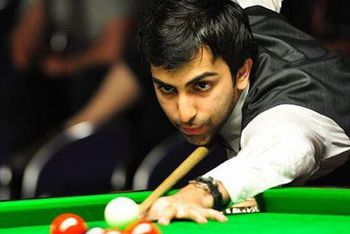Adelaide, Sep 27: India’s most successful cueist Pankaj Advani added another feather to his cap by winning the IBSF World Billiards Championship, by outplaying his opponent in the final to take his world title count to 14.
 Advani, 30, left the spectators spellbound with his prolific play and indisputable mastery over the 3-ball game, demolishing Singapore’s Peter Gilchrist by 1168 points.
Advani, 30, left the spectators spellbound with his prolific play and indisputable mastery over the 3-ball game, demolishing Singapore’s Peter Gilchrist by 1168 points.
On lifting his 14th world crown in style, the Indian ace said, “I was determined to get even with Peter (Gilchrist), after losing the point format final to him. A productive chat with my sports psychologist brother Shree and a good night’s sleep did the trick. We discussed my strategies and mental approach the night before the big final and it all panned out perfectly.”
Bengaluru’s ‘Golden Boy’ was in roaring form and appeared keen to not only defend his Time format world title, but also avenge his loss of the Point format championship to Gilchrist, which happened a week ago.
In the opening visit, Advani fired in a quick century (127) to take the initial lead. Failing to capitalise, Gilchrist handed over an opportunity to the Indian star and it was taken full advantage of.
The 2015 6-red snooker world champion showed his fine prowess in billiards by smashing in two back-to-back triple centuries (360 and 301), making the match a foregone conclusion in the first hour itself.
With a comfortable 700-point lead, India’s posterboy of cuesport continued to add insult to injury with breaks of 284, 119, 101 and 106 in quick succession to extend his lead to 1100 points at the halfway mark of the 5-hour final.
On resumption in the second half, Advani continued to punish his opponent with two more centuries, but a spirited fightback by the Singaporean in the form of a big double century (284) along with a couple more centuries reduced his deficit.
But Advani was not quite done yet. He continued his devastating form with some aggressive scoring. The last nail in the coffin was a fluent and flawless 430 break that was unfinished as the match reached the end of its 300 minutes duration.
Advani has stamped his authority yet again in billiards at the world level for a few years now. After annihilating England’s Mike Russell in the final of 2012 edition of the Time format, Advani went on to win twin titles in both Point and Time formats in 2014.
“I’ve been on the move last couple of months competing in many tournaments back to back, in both snooker and billiards. The stint started with winning the world 6—red snooker championship and ended with this world title in billiards making it a very satisfying phase of the year for me,” the champion further added.





Comments
Add new comment